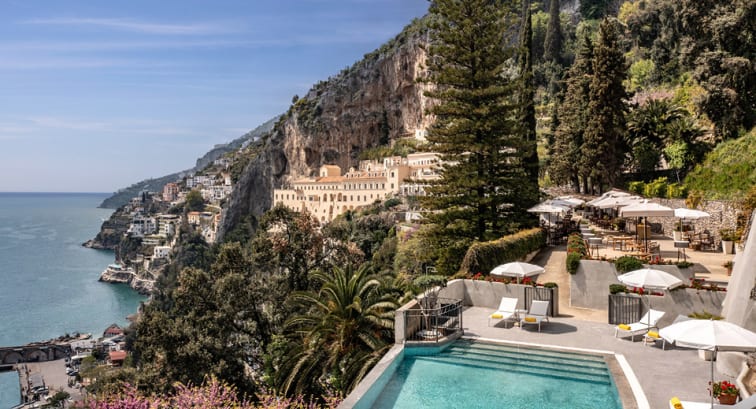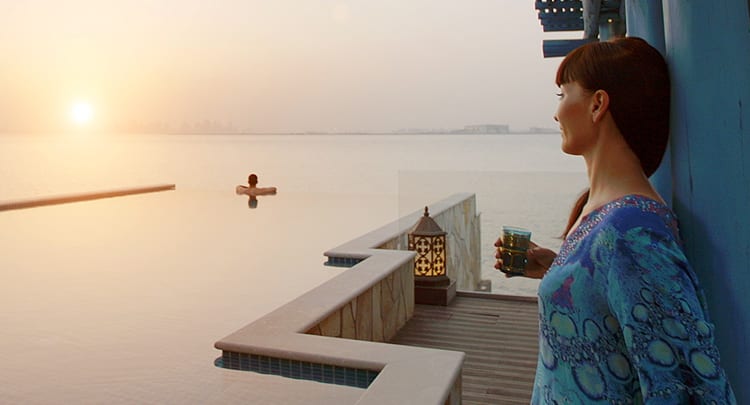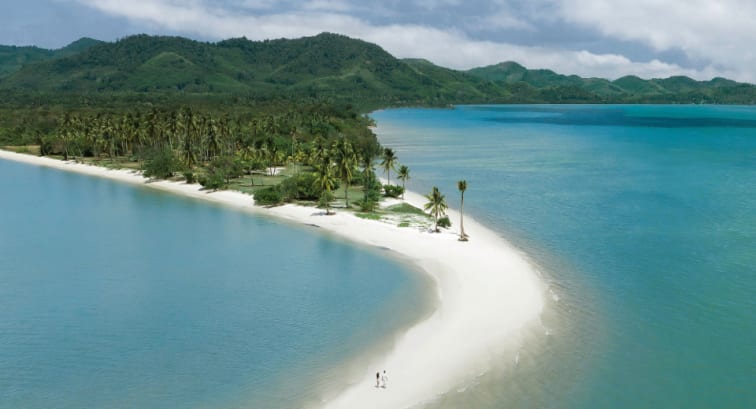Uncovering the History of the "Divine Coast" of Amalfi With Fra Marcus
More than 800 years of history echo through the halls of Anantara Convento di Amalfi Grand Hotel, a painstakingly restored cliffside Capuchin convent on Italy’s famed Amalfi Coast. Few people know it better than Fra Marcus, a Conventual Franciscan Friar who serves also as vicar of the nearby Duomo of Ravello, and can often be seen wandering the halls of the Anantara guiding guests on journeys of inner contemplation and active exploration. We sit down with Fra Marcus to discuss his life as a Franciscan friar, the history of the hotel and the experiences guests can enjoy along the “divine coast” of Amalfi.
Visit the website to see more about experiences with Fra Marcus and plan your stay.
Q: Share with us a little about yourself.
Fra Marcus: I’m a Franciscan friar, a priest. I'm German and Austrian, but I came here to Italy to study and I remained — I didn’t go back to my homeland, so stayed in the province of Naples, where I have been working since the 1980s. I have worked mostly with youth and with the Scout movement, and am now the vicar of the Duomo of Ravello where I am the last six years.Q: How did you initially get involved with hosting experiences at Anantara?
Fra Marcus: I’m a friend of the general manager, Giacomo [Sarnataro]. In April, he asked me if I wanted to collaborate. So, I asked my superiors and I told him that I would be available to try this experience. I agreed because the idea of Anantara is not only to give a place for sleeping and eating, but to give you the possibility to make a truly indigenous "life" experience. It means I hope we will be able to share the traditions of the place, the culture of the place, the specialities of the location, also to meet different people like Pope Francis asked us to do.

Q: Tell us about the "Convento" part of Anantara Convento di Amalfi Grand Hotel and its past as a monastery.
Fra Marcus: This hotel is a really, really old monastery, going all the way back to the 13th century. In 1208, the Cardinal Pietro Capuano came to Amalfi bringing the relics of Saint Andrew the Apostle to Amalfi Cathedral — it is still dedicated to Saint Andrew, and contains the Crypt of Saint Andrew where his relics can be found.
In 1213, he had the idea to found a monastery in Amalfi for a community of monks, to pray for his family and the Amalfitanian people. The Capuano family is from Amalfi and his uncle, Matteo Capuano, was at the time the Archbishop of Amalfi. So, these two went to the priest Costantino Oliva who at that time held the little church of San Pietro ad Tuczulum that had been founded in that area in the 8th century in a cave. They asked if he could leave so they could build their monastery. He agreed, so they did.
They brought in Benedictine Cistercensian monks from Fossanova in the south of Rome to establish this monastery. Then, in 1223, Pope Honorius III made this monastery a commendatory abbey, which meant they had to produce money for the named commendatory abbot. In July of the same year, Emperor Frederick II sent a special diploma to the Cistercian abbey he took them “sub speciali protecione et defensione” and named it Paladin Chapel.
This went on up to the 14th century, when a major economic crisis stuck all over Europe and the monks in 1450 left the monastery, abandoning it for more than 100 years. That was until 1583, when the Capuchins were asked to come here, a response to the bishops asking the Pope to send friars to provide spiritual assistance. They remained here up to the 18th century.
In the 18th century, the Napoleonic Wars brought a campaign all over Italy of suppression of all religious monasteries and convents. Every religious institution was shut down and their belongings distributed to the treasury of the new civilian monarch. I’m a Franciscan Conventual — we too have had our convent of Saint Antony (founded like at Ravello by Saint Francis around 1220) here in Amalfi in the front of the bay, which we lost in the 18th century too.

Q: Aside from the hotel’s incredible history, what else makes it special in your opinion?
Fra Marcus: Here we are trying to respect what is the tradition of this place. Imagine, this certain atmosphere, you have to feel it: the hundreds and hundreds of years of praying and meditation that have gone on in this place. When this monastery became a hotel, a lot of work has gone in to preserving the atmosphere of a monastery, to ensuring guests are welcome like in a convent like in a family. To perhaps having a real spiritual experience.
It’s hard to understand if you haven’t seen it, been in touch. It’s the Divine Coast. There’s a nice expression to explain the Amalfi Coast: when the angel Lucifer was thrown out from Heaven he was so displeased that he wept, and when the other angels threw him down, he tore down a piece of heaven as he fell. This is the Divine Coast.

Q: What are some of the experiences we could have together at the hotel?
Fra Marcus: You can make a retreat. You can re-find yourself. There’s a possibility to speak, to meet, to hang around together, make a prayer. Or you can celebrate your wedding here. Or, simply we can go in the garden and we will speak about the coast, its history, its culture. We will collect something from the garden and maybe you can go in the kitchen and we will cook together under the direction of chef Claudio [Lanuto].
We can go up to Ravello, take a tour to Villa Rufolo or one of the others, whose are famous all over the world. Ravello is a famous city. Famous for music, for concerts, the music festival of Ravel with Wagner. You can come up to my convent, founded by Saint Francis in 1222 — we have the biggest library all over of the coast.
We can do a simple trek in the mountains. The most famous trek is the Path of the Gods, from Agerola to Positano. It's a three- or four-hour walk. It's not very difficult, but you should be accompanied by a local guide, so you have to have good shoes and be in good physical condition.
We can cook something simple like they do in the convents and the monasteries. The idea is you have to re-find your peace and "stay well". The motto of our hotel, our monastery – we don't say "good morning", we say "pace e bene" — "peace and all good".


Q: On that note, tell us about the "Pace e Bene" tour around the hotel.
Fra Marcus: There is a tour inside the monastery about history, spirituality, the garden, and the Monk’s Walk Meditation. Together we can build a rosary. I can explain to you the different plants we are growing in the garden — you will see the same plants, the same ingredients we use in the kitchens and in the spa. You will see the cosmetic products, like lemon, like mint, like Indian cactus, and so on.
Maybe we will just stop and look at the sea. Or sit under the tree and collect some fruit and we’ll eat it. Maybe you will sit with me or maybe you will go out in the cloister. There are many, many possibilities. The point is really to feel that this is a special place with a special spirit.
Q: What is your own favourite experience with guests at Anantara?
Fra Marcus: Normally just going around showing them the possibilities so that they can choose something that’s interesting for them. I think the most important thing is to meet and to be able to embrace and to help them be well.
In Italian, we say “accoglienza” — to be someone who is there in that moment and has time for you, to hear what you want to say, to try to understand what you need, and help you to simply stop for a moment. Here is a place to regain yourself and to regain your peace, to feel well, to feel welcome — I think that’s the most important. To be able to “accogliere”.


Q: Can you tell us about some of the Christmas events you have planned at Anantara this year?
Fra Marcus: Christmas will have many, many special events. We will begin with the lighting of the Christmas Tree at the Cloisters. There will be special cooking classes with Chef Claudio, concerts, and social activities for the guests. We will also assist at the arrival of the Peace Light of Bethlehem.
There will also be a little Christmas market at the hotel, with a big fire and local artists and associations. Anantara is always very open to sustaining local associations that are working to serve social needs. On the 24th and the 25th of December and on New Year’s Day there will be special dinner events. There’s a big programme.
Curated for You
You Might Also Like




